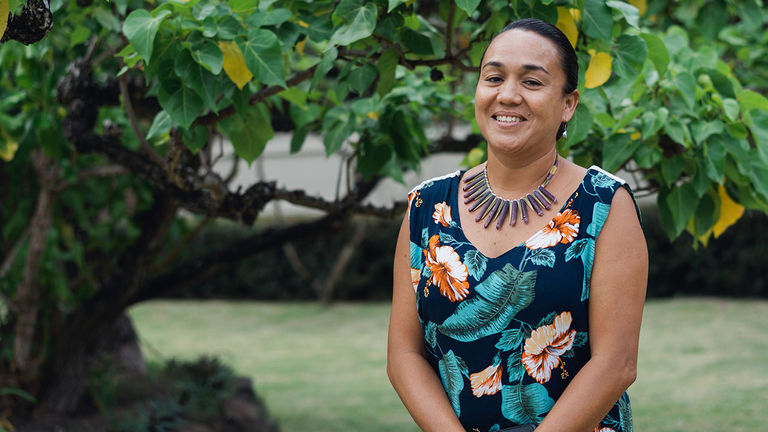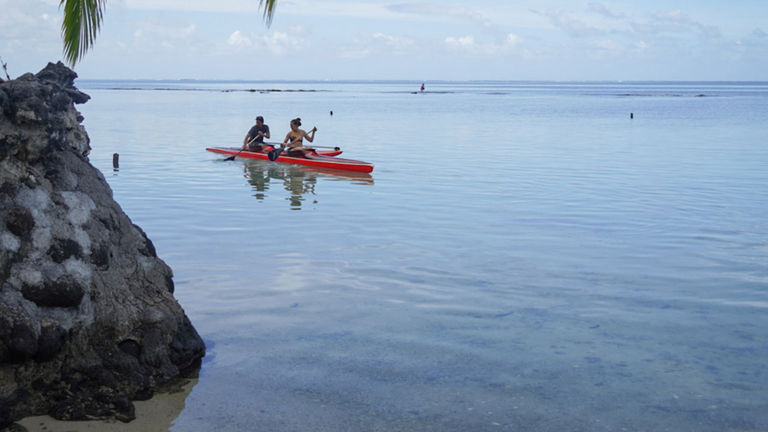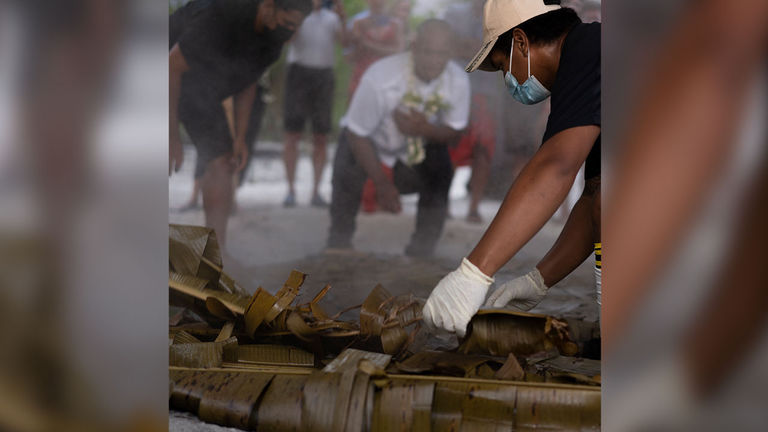I knew a Bora Bora honeymoon would leave me awestruck. With bright-blue lagoons, overwater bungalows and verdant volcanic peaks, the French Polynesian island is the definition of paradise. But the incredible scenery is only half of the destination’s beauty — a fact I learned while celebrating newlywed life at Conrad Bora Bora Nui.
The upscale islet resort, which features overwater bungalows and adventures galore, is part of a growing local movement to preserve and protect Polynesian culture from the threats of modernization.
In Bora Bora and the islets that surround it, the revival is largely spearheaded by the Conrad’s cultural and recreation manager, Francoise Postma, a native Polynesian who was born and currently lives on the island. She gave me and my husband a tour around the property, sharing the sacred history behind the resort’s many cultural activities that she brought to fruition.
 Conrad’s cultural and recreation manager, Francoise Postma, reshaped the resort’s portfolio of recreational activities.
Conrad’s cultural and recreation manager, Francoise Postma, reshaped the resort’s portfolio of recreational activities.
Credit: 2022 Stephanie Vermillion
In 2019, Postma approached the resort’s leadership team with an idea. In addition to offering experiences such as snorkeling and stand-up paddleboarding, the Conrad could engage guests with native-led immersions.
Before, there were only a handful of activities, and they weren’t reflecting the large cultural and traditional values of our island.
“Before, there were only a handful of activities, and they weren’t reflecting the large cultural and traditional values of our island,” she said. “For the last two years, we have put an even greater effort into creating more cultural and traditional offerings.”
While many resorts on Bora Bora offer cultural experiences, Postma notes that they are largely provided via external partners. The Conrad, however, built its cultural department, and its activities, with the on-site (and native Polynesian) recreation team.
“Conrad Bora Bora Nui is a pioneer in the development of the story of Bora Bora,” Postma said.
Conrad Bora Bora Nui’s Cultural Activities
The cultural-immersion lineup includes traditional cooking demonstrations, jewelry making, dance lessons and language classes. Postma says the experiences help guests more intimately understand the region, while simultaneously supporting Indigenous Polynesians — like Postma — as they keep their traditions alive.
It was forbidden for my grandparents to dance — they fought for that right. This isn’t entertainment for guests. It’s about celebrating, sharing and preserving our culture.
“I’m scared that in 20 or 30 years, you won’t hear our language, or you won’t see our culture,” Postma said, noting that fewer and fewer children speak the native Tahitian language.
Globalization threatens Indigenous cultures around the world; it has put hundreds of languages at risk of extinction. Plus, native Polynesians across the South Pacific have long faced cultural suppression. When European missionaries arrived on the islands in the 1800s, they banned traditions such as dancing for roughly 100 years. It wasn’t until the 1960s that traditional dance truly had a renaissance.
“It was forbidden for my grandparents to dance — they fought for that right,” said Postma, who notes that these activities are more about the staff than the tourists. “This isn’t entertainment for guests. It’s about celebrating, sharing and preserving our culture.”
Trying Out Va’a Canoeing
One traditional experience the Conrad offers that Postma is particularly proud of is va’a: paddling via a traditional outrigger canoe. Ancient Polynesians relied on these canoes, and their own deep knowledge of nature, to navigate the Pacific Ocean without instruments. These ancient wayfinding skills ultimately helped Polynesians settle across the Pacific islands.
 Guests at Conrad Bora Bora Nui can take a lesson on a va’a outrigger canoe.
Guests at Conrad Bora Bora Nui can take a lesson on a va’a outrigger canoe.
Credit: 2022 Stephanie VermillionIn more recent decades, va’a paddling with small, traditional canoe-sized vessels has become a major competitive sport within and beyond the South Pacific. When my husband and I gave va’a a try, we quickly realized how much skill and teamwork is required to adopt the rhythm and glide like the pros.
In addition to lessons, Postma says the property is exploring how to use the canoes for more eco-friendly travel around the island.
“We’re currently in the process of using them at the hotel to reduce our impact on the lagoon,” she said. “This will eliminate motors, and we are pushing to develop this idea to have a real impact on the island.”
Va’a transport is far from the Conrad’s only sustainability endeavor. In 2021, the property introduced an exclusive partnership with global nonprofit Manta Trust. Through this collaboration, the resort supplies the organization with financial support and access to the hotel’s biodiverse waters for critical species research.
 During the property’s Polynesian Dinner and Show, guests can learn details about traditional underground cooking.
During the property’s Polynesian Dinner and Show, guests can learn details about traditional underground cooking.
Credit: 2022 Stephanie VermillionIn turn, scientists from the French Polynesia Manta Project run snorkel and dive trips, plus on-land presentations, for Conrad guests. It’s all in an effort to educate visitors about the magnificent and increasingly threatened manta rays.
From outrigger canoeing and snorkeling to biking and kayaking, my husband and I worked up quite the appetite. Our favorite Conrad meal was the Polynesian Dinner and Show, which we attended on our final night.
It’s a full-on cultural and culinary immersion, with demonstrations detailing the tradition of underground cooking; a mind-blowing buffet of native fare; and Polynesian dancing by native team members, who graciously and passionately share their ancestors’ rhythms beneath a twinkling sea of stars.
As my husband and I strolled back to our bungalow that night, we recapped our favorite honeymoon memories. Sure, the sights, swims and straight-from-the-deck snorkels made the cut, but they didn’t take first place. Getting that peek into Polynesian culture — and knowing our trip helped support Postma’s push to protect it — was leaps and bounds above everything else.